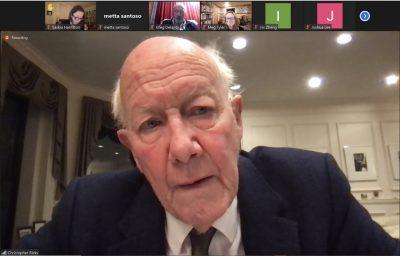Professor Christopher Ricks began his lecture last Tuesday by reciting a William Barnes poem, “The Hill-Shade,” in memory of the recent loss of his friend, former student and colleague, Jennifer Formichelli. Boston University graduate and BU Academy teacher Formichelli was struck and killed by a bus earlier that day in Mattapan.

Ricks, the William M. and Sara B. Warren professor of the humanities at BU and the co-founder of the Editorial Institute, presented his lecture entitled “The Best Words in the Best Order” on Oct. 26 as part of the BU Poetry Reading Series. He focused on the difference between prose and poetry in literary criticism.
Before BU, he was a professor at numerous other institutions, such as Oxford University and Cambridge University. The lecture he presented on Tuesday was also his inaugural lecture at Oxford as the Professor of Poetry, Ricks said. He explored the perception that prose is inferior to poetry.
The poem was then followed by a recording of American poet David Ferry reading translated poems by French poets Pierre de Ronsard and Charles Baudelaire.
“Literature should include everything,” Ricks said in an interview. “The great writers of prose like Jane Austen or Samuel Beckett or Mark Twain or Henry James, these are just as great writers as the poets.”
Meg Tyler, associate professor of humanities in the College of General Studies and the director of the Poetry Reading Series at BU, intended this lecture to help people “think more carefully about the categories of writing and the genres of literature.”
“I just hope that he will challenge all of our assumptions,” she said before the lecture on Tuesday.
Through analyzing poets such as Samuel Taylor Coleridge and T.S. Eliot, Ricks illustrates how we should be more critical in the way we understand and analyze poetry. During the lecture, Ricks said in poetry, “the meaning alone doesn’t determine the phrase.”
Zoe Rice, a sophomore in CGS, said the lecture gave her a new perspective on prose.
“He argues that poetry isn’t just a higher version of prose,” Rice said. “Prose itself can stand and be profound just by the words and the message that it’s saying.”
Furthermore, in the age of misinformation and digital media where fake news engulfs people, Ricks emphasized the difference between manipulations and art.
“Art is imagining the real thing,” he said.
Tyler said Ricks’s lecture reminded her about how political division has been influencing the literature and humanities. She said it shows why sentence structure and diction used are as important as ever.
“Every sentence we utter or write should have meaning and should have impact,” Tyler said. “I always tell my students ‘I just want to return to the sentence level. How do we make the best sentence we possibly can?’”
Similarly, Rice said she feels that she could implement what Ricks had talked about regarding distinguishing poetry and prose in her writing. She said that instead of trying to be poetic in her writing, she could embrace prose.
“It doesn’t have to be rhythmic or anything, but it can be perfect in a smaller sense,” she said.
While Ricks distinguished poetry and prose in this lecture, he was not trying to show that one is better than the other. He does not have a specific position on this as it is not something political like a “trade union negotiation” or “demarcation disputes.”
Ricks said in an interview that his lecture educated others to have a better understanding of the importance of prose.
“I would like people to enjoy and appreciate and value works of art,” Ricks said. “There are a lot of very important old things that are true, and that are in danger of being forgotten. I want people to see the ways in which works of art, works of literature for me, are wise, and perceptive and beautiful.”


























































































































Meghna Chhabra • Oct 29, 2021 at 1:29 pm
Thank you for such a wonderful article, Metta! Very well written!